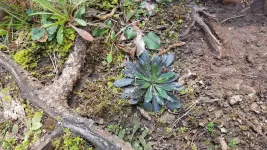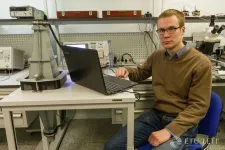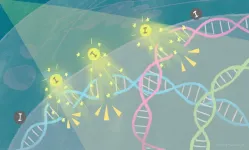(Press-News.org) A new method of DNA testing on cocoa beans could revolutionise the chocolate industry, offering consumers greater reassurance about the origins and ethics of their beloved confectionery, and giving the global cocoa industry a precision tool to help end slavery and child labour.
Researchers from the University of Bath, University of the West of England, and Surrey Business School have proven a low-cost method which compares DNA in chocolate products to the cocoa when it is farmed. This means cocoa can be reliably traced back from an individual chocolate bar to the specific farms which cultivated the cocoa in it, a major advance on current fairtrading, certification and sustainability practices.
"This has the potential to revolutionise sustainability in a market rife with environmental destruction and human misery in that firms will now be able to buy from a specific set of known farms which have approved labour and environmental standards and to prove that their chocolate is made with that cocoa," said Michael Rogerson, researcher at the University of Bath School of Management.
"And activists, NGOs, and governments, will be able to prove that the chocolate bar you buy in your local supermarket contains cocoa grown on farms which abuse the environment or employ child or forced labour. We know consumers care about this - but they need accurate, reliable information to make ethical choices," Rogerson said.
Rogerson said the research team had developed a method where the DNA sampling would cost around £5 per farm, putting this well within the reach of the $78 billion cocoa supply industry, and government and NGO foreign aid budgets.
"It would cost a tiny fraction of the industry's revenues to build such a database in Ghana and Ivory Coast, which is the source of more than 70% of the world's cocoa production. There are an estimated 2.2 million child labourers working on farms in West Africa and reports suggest the problems are worsening despite promises made by large chocolate producers," he said.
Rogerson said the research team's interviews of chocolate and cocoa industry stakeholders along the whole supply chain revealed a certain 'fatalism' about the child labour issue and a sense it was too great a problem to tackle.
The interviews also showed third-party ethical certification and labelling was regarded primarily as a marketing ploy, easily understood by consumers, considered desirable, but ultimately in need of improvement to be meaningful.
"What we are offering industry is a way to break out of that fatalism, and consumers the reassurance that when they pick an 'ethical' product that it is genuinely ethical. We could also see third-party certifiers like Fairtrade or the Rainforest Alliance strengthening their offering and credibility with this," he said.
Rogerson said the difficulty of tracing cocoa from farms to the end product was at the heart of the issue. The majority of the world's cocoa is collected by small-scale traders and taken to larger trading facilities, where vast quantities are traded on international markets. Tracing beans back to the farm of origin is a challenge due to the number of different parties aggregating and mixing crops early in the supply chain. He said current certification systems, while laudable in their intent, were not addressing the core issues.
"And this is not a new issue. During our research we found reports that in 1905 Cadbury investigated claims of abuses on cocoa plantations on the islands of São Tomé and Príncipe, in Central Africa. The industry has known of the problems for over 100 years, and not yet found a viable solution to trace cocoa through supply chains, perhaps until now," he said
Biomarkers - biochemical 'barcodes' extracted from plant DNA - offer a way to resolve this issue, Rogerson said.
Biomarkers are unique indicators of a plant and the particular environment in which it plant is grown. Biomarkers in cocoa beans are sufficiently hardy that they can survive the industrial processes used in chocolate making, allowing for the identification of individual cocoa farm beans from a mixture of different origins in final products.
Biomarkers are produced by isolating DNA at cocoa farms, enabling the creation of a database of those markers specific to each farm. Further biomarkers can be taken from the location of cocoa fermentation as these also have unique signatures. Once a database has been created with sufficient samples, chocolate bought anywhere in the world can be traced back to farms of origin. This enables a chocolate producer, or even a customer given access to the right technology, to know precisely where the cocoa in their chocolate comes from.
Rogerson said the solution had been proven in a small pilot study but the approach would need operationalization at scale, something the chocolate industry could accomplish, given the will or incentive to act.
"If the method can be scaled effectively there can be no excuses for continued abuses within chocolate supply chains. Claims that farms are too widespread or remote, or that the trading of cocoa through various intermediaries makes it impossible to trace become suddenly empty. I would like the chocolate industry and governments to honestly face this ethical challenge - we have developed a tool they can deploy in that fight," he said.
Notes to editors
* For further information please contact Tony Roddam at the University of Bath press office on +44 7971 500460 or press@bath.ac.uk
The University of Bath is one of the UK's leading universities both in terms of research and our reputation for excellence in teaching, learning and graduate prospects.
The University is rated Gold in the Teaching Excellence Framework (TEF), the Government's assessment of teaching quality in universities, meaning its teaching is of the highest quality in the UK.
In the Research Excellence Framework (REF) 2014 research assessment 87 per cent of our research was defined as 'world-leading' or 'internationally excellent'. From developing fuel efficient cars of the future, to identifying infectious diseases more quickly, or working to improve the lives of female farmers in West Africa, research from Bath is making a difference around the world. Find out more: http://www.bath.ac.uk/research/
Well established as a nurturing environment for enterprising minds, Bath is ranked highly in all national league tables. We are ranked 6th in the UK by The Guardian University Guide 2021, and 9th in The Times & Sunday Times Good University Guide 2021 and 10th in the Complete University Guide 2021. Our sports offering was rated as being in the world's top 10 in the QS World University Rankings by Subject in 2021.
INFORMATION:
What the fruit fly is to zoologists, the thale cress is to botanists. The widespread herb with the botanical name Arabidopsis thaliana serves them as a model organism from which knowledge can be gained for other plants. It is therefore extremely well researched - also genetically. For example, it is now known that the genetic material of Arabidopsis thaliana (its genome) comprises around 125 million base pairs. It's like having a Lego manual in front of you that is 125 million letters long and contains everything you need to know to build an Arabidopsis plant.
Similar to humans, different Arabidopsis specimens are generally not genetically identical. If you were to compare the construction manual of all plants of this species, you would encounter differences in about 10 million places, ...
Dr. Iair Arcavi, a Tel Aviv University researcher at the Raymond and Beverly Sackler Faculty of Exact Sciences, participated in a study that discovered a new type of stellar explosion - an electron-capture supernova. While they have been theorized for 40 years, real-world examples have been elusive. Such supernovas arise from the explosions of stars 8-9 times the mass of the sun. The discovery also sheds new light on the thousand-year mystery of the supernova from A.D. 1054 that was seen by ancient astronomers, before eventually becoming the Crab Nebula, that we know today.
A supernova is the explosion of a star following a ...
A new study co-authored by the UBC Sauder School of Business has found that when senior managers mistreat workers, middle managers often attempt to quietly smooth things over.
Robin Hood was known for stealing from the rich and giving to the poor -- but while he may have lived in Sherwood Forest centuries ago, he would have fit right in as a middle manager in today's business world.
Studies have shown that when employees are mistreated by senior leaders, employees can often get back at them by doing things like gossiping, stealing office supplies or calling in sick when they're well. But according to new research from UBC Sauder, middle managers also get in on the act, and attempt to address workplace injustices by secretly helping out their subordinates ...
Kamil Gareev, Associate Professor at ETU "LETI," justified the prospects of using magnetotactic bacteria to treat malignant tumors.
LETI researchers identified the main properties of magnetotactic bacteria and described the possibilities of their application in medicine. The results obtained will help create theranostic agents in neurooncology and cardioprotection. The results of the joint study with colleagues from St. Petersburg State University, RAS Institute of Cytology, and RAS Institute of Biotechnology were published as an overview article in the journal Magnetochemistry.
Magnetotactic bacteria (MTB) are distinguished by their ability to synthesize magnetosomes, special cellular organelles in which magnetite biomineralization occurs. Thanks ...
Autistic people need extra help in going green say researchers behind a new study which argues for a more inclusive environmental agenda.
Climate action movements are gathering extraordinary pace due to international campaigners like Greta Thunberg, whose autism has been well documented. Being autistic has been used to explain and celebrate, but also diminish and denigrate, her activism.
Thunberg, for example, reports that being autistic is a psychological "gift" and "superpower" that underpins her environmental attitudes and behaviours. This has fuelled speculation - in the media and the general public - that autistic ...
DALLAS, July 14, 2021 -- Heart failure hospitalizations and costs related to methamphetamine use jumped sharply over a decade in California, according to new research published today in Circulation: Cardiovascular Quality and Outcomes, an American Heart Association journal.
"Our study results should bring urgent attention to this insidious yet rapidly growing form of severe heart failure - methamphetamine-related heart failure, which is taking the lives of young people, straining health care resources and threatening to spread like wildfire in California, the West and to the rest of the nation," ...
PHOENIX, Ariz. -- July 14, 2021 -- The results of a study by an international scientific team co-led by the Translational Genomics Research Institute (TGen), an affiliate of City of Hope, suggest that -- like pouring water atop a wellhead before pumping -- the airway cells of patients with chronic lung diseases are "primed" for infection by the COVID-19 virus, resulting in more severe symptoms, poorer outcomes and a greater likelihood of death.
The study -- published today in Nature Communications -- details the genetic changes caused by chronic lung disease in the molecular makeup of a variety of cells, including the epithelial cells that line the lung and airways. The ...
The extraordinary ability of animals to rapidly evolve in response to predators has been demonstrated via genetic sequencing of a waterflea population across nearly two decades.
In a new study, published in Nature Communications, scientists at the Universities of Birmingham in the UK, the Katholieke Universiteit Leuven in Belgium, and the Leibniz Institute for Freshwater Ecology and Inland Fisheries (IGB), Berlin, were able to identify more than 300 genes that vary in the genome of the waterflea.
These genes, which account for about about 3 per cent of all sequenced waterflea genes, ...
Cancer cell death is triggered within three days when X-rays are shone onto tumor tissue containing iodine-carrying nanoparticles. The iodine releases electrons that break the tumor's DNA, leading to cell death. The findings, by scientists at Kyoto University's Institute for Integrated Cell-Material Sciences (iCeMS) and colleagues in Japan and the US, were published in the journal Scientific Reports.
"Exposing a metal to light leads to the release of electrons, a phenomenon called the photoelectric effect. An explanation of this phenomenon by Albert Einstein in 1905 heralded the birth of quantum physics," says iCeMS molecular biologist Fuyuhiko Tamanoi, who led the study. "Our research provides ...
July 14, 2021 (Toronto) A new study from the World Health Organization's (WHO) International Agency for Research on Cancer (IARC), published in the journal Lancet Oncology, has found an association between alcohol and a substantially higher risk of several forms of cancer, including breast, colon, and oral cancers. Increased risk was evident even among light to moderate drinkers (up to two drinks a day), who represented 1 in 7 of all new cancers in 2020 and more than 100,000 cases worldwide.
In Canada, alcohol use was linked to 7,000 new cases of cancer in 2020, including 24 per cent of breast cancer cases, 20 per cent of colon cancers, 15 per cent of rectal cancers, and 13 per cent of oral and liver cancers.
"All ...




